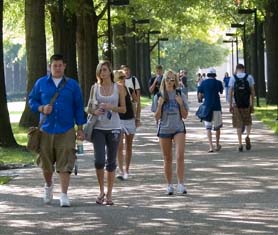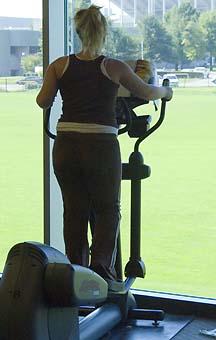Freshman 15' Isn't Inevitable
Freshman 15' Isn't Inevitable

Freshmen bring a lot of personal effects when they arrive at college for the first time. By the end of the year, they will have amassed even more. But one thing they don’t have to accumulate is extra weight, otherwise known as the dreaded “freshman 15.”
Recognizing the behaviors that lead to weight gain can help students avoid adding extra pounds. For those who may be away from home for the first time, campus life can be filled with temptations, including a multitude of meal choices in campus dining facilities, late night pizza deliveries and a plethora of easily accessible vending machines filled with high-calorie snacks and beverages. In addition, normal homesickness or anxiety from being in a new situation can create stress, which may trigger emotional eating.
The key to preventing the Freshman 15 is to start the semester with a plan said Lori Rice, program coordinator for the University of Kentucky Health Education through Extension Leadership program. The first step would be to make sure that fruits, vegetables and whole grain are included in your meals. That’s important when a student is faced with an array of choices on a typical buffet line. Choose low-fat dairy products and lean cuts of meat or other protein sources such as beans.
“Listen to your hunger cues,” Rice said. “Just because the food is there doesn’t mean you have to pile your plate up. Stop when you’re full.”
 And give yourself time to become full. It can take 20 minutes for the brain to get the message that the stomach is full. Instead of rushing through a meal, take the time to “consciously” eat. That can be difficult with a typical student’s schedule, but if you plan ahead and take the time to enjoy your food with friends in a relaxed atmosphere, your tendency will not be to gulp down more food than your body actually needs.
And give yourself time to become full. It can take 20 minutes for the brain to get the message that the stomach is full. Instead of rushing through a meal, take the time to “consciously” eat. That can be difficult with a typical student’s schedule, but if you plan ahead and take the time to enjoy your food with friends in a relaxed atmosphere, your tendency will not be to gulp down more food than your body actually needs.
And though skipping meals sounds as if it would help curb calorie intake, in reality it does the opposite. Rice said that two things could happen. You may become super hungry and overeat to compensate for the missed meal. And your body itself could compensate for the missed meal by slowing down its metabolism.
“Whenever we start skipping meals our body kind of goes into what can be called starvation mode in the sense that it starts conserving those calories because it thinks that it’s not going to get food again,” she said. “The body needs to be fueled every few hours to keep the metabolism going.”
Keep plenty of healthy snacks on hand for those late-night study sessions. Rice suggests looking for low-fat snacks. Fruit will keep for a while in a dorm room. Pretzels, though higher in carbohydrates, are still lower in fat and therefore a better choice than chips. Low-fat yogurt is a good source of calcium. Packaged fruits and vegetables are available in the produce section of most stores these days. They’re already washed, sliced and ready to munch on straight from the bag.
Exercise is every bit as important as diet in maintaining a healthy weight. Rice recommends scheduling time for physical activity.
 “Once classes start and your schedule is known, start planning when you’ll fit in your physical activity. Schedule it and stick to it,” she said. “It will help combat some of those extra calories … and it will help to alleviate the stress that comes with being a student.”
“Once classes start and your schedule is known, start planning when you’ll fit in your physical activity. Schedule it and stick to it,” she said. “It will help combat some of those extra calories … and it will help to alleviate the stress that comes with being a student.”
Rice recommends checking out options available from campus recreation. Most campuses, she said, have a campus recreation center that full-time students may use free of charge.
If the thought of running in place on a treadmill or high stepping on a stair stepper brings on yawns and the overpowering urge to flee toward the nearest TV lounge and candy machine, take heart. There are other options.
“Intramural sports and games can be a fun way to get in activity that doesn’t feel like exercise at all,” Rice said. “In addition, just adding extra physical activity to your day in general can help to offset extra calories you might be eating and help in weight control. Take the long way to walk to classes, add an extra lap around campus at the end of the day before heading back to the dorm.”
